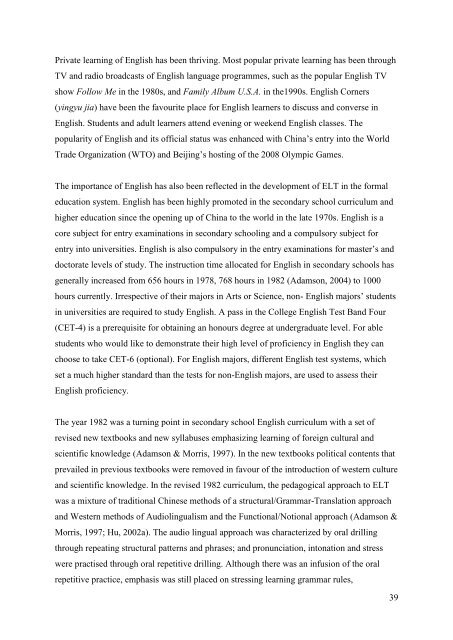The challenge of academic writing for Chinese students within ...
The challenge of academic writing for Chinese students within ...
The challenge of academic writing for Chinese students within ...
Create successful ePaper yourself
Turn your PDF publications into a flip-book with our unique Google optimized e-Paper software.
Private learning <strong>of</strong> English has been thriving. Most popular private learning has been through<br />
TV and radio broadcasts <strong>of</strong> English language programmes, such as the popular English TV<br />
show Follow Me in the 1980s, and Family Album U.S.A. in the1990s. English Corners<br />
(yingyu jia) have been the favourite place <strong>for</strong> English learners to discuss and converse in<br />
English. Students and adult learners attend evening or weekend English classes. <strong>The</strong><br />
popularity <strong>of</strong> English and its <strong>of</strong>ficial status was enhanced with China‘s entry into the World<br />
Trade Organization (WTO) and Beijing‘s hosting <strong>of</strong> the 2008 Olympic Games.<br />
<strong>The</strong> importance <strong>of</strong> English has also been reflected in the development <strong>of</strong> ELT in the <strong>for</strong>mal<br />
education system. English has been highly promoted in the secondary school curriculum and<br />
higher education since the opening up <strong>of</strong> China to the world in the late 1970s. English is a<br />
core subject <strong>for</strong> entry examinations in secondary schooling and a compulsory subject <strong>for</strong><br />
entry into universities. English is also compulsory in the entry examinations <strong>for</strong> master‘s and<br />
doctorate levels <strong>of</strong> study. <strong>The</strong> instruction time allocated <strong>for</strong> English in secondary schools has<br />
generally increased from 656 hours in 1978, 768 hours in 1982 (Adamson, 2004) to 1000<br />
hours currently. Irrespective <strong>of</strong> their majors in Arts or Science, non- English majors‘ <strong>students</strong><br />
in universities are required to study English. A pass in the College English Test Band Four<br />
(CET-4) is a prerequisite <strong>for</strong> obtaining an honours degree at undergraduate level. For able<br />
<strong>students</strong> who would like to demonstrate their high level <strong>of</strong> pr<strong>of</strong>iciency in English they can<br />
choose to take CET-6 (optional). For English majors, different English test systems, which<br />
set a much higher standard than the tests <strong>for</strong> non-English majors, are used to assess their<br />
English pr<strong>of</strong>iciency.<br />
<strong>The</strong> year 1982 was a turning point in secondary school English curriculum with a set <strong>of</strong><br />
revised new textbooks and new syllabuses emphasizing learning <strong>of</strong> <strong>for</strong>eign cultural and<br />
scientific knowledge (Adamson & Morris, 1997). In the new textbooks political contents that<br />
prevailed in previous textbooks were removed in favour <strong>of</strong> the introduction <strong>of</strong> western culture<br />
and scientific knowledge. In the revised 1982 curriculum, the pedagogical approach to ELT<br />
was a mixture <strong>of</strong> traditional <strong>Chinese</strong> methods <strong>of</strong> a structural/Grammar-Translation approach<br />
and Western methods <strong>of</strong> Audiolingualism and the Functional/Notional approach (Adamson &<br />
Morris, 1997; Hu, 2002a). <strong>The</strong> audio lingual approach was characterized by oral drilling<br />
through repeating structural patterns and phrases; and pronunciation, intonation and stress<br />
were practised through oral repetitive drilling. Although there was an infusion <strong>of</strong> the oral<br />
repetitive practice, emphasis was still placed on stressing learning grammar rules,<br />
39


